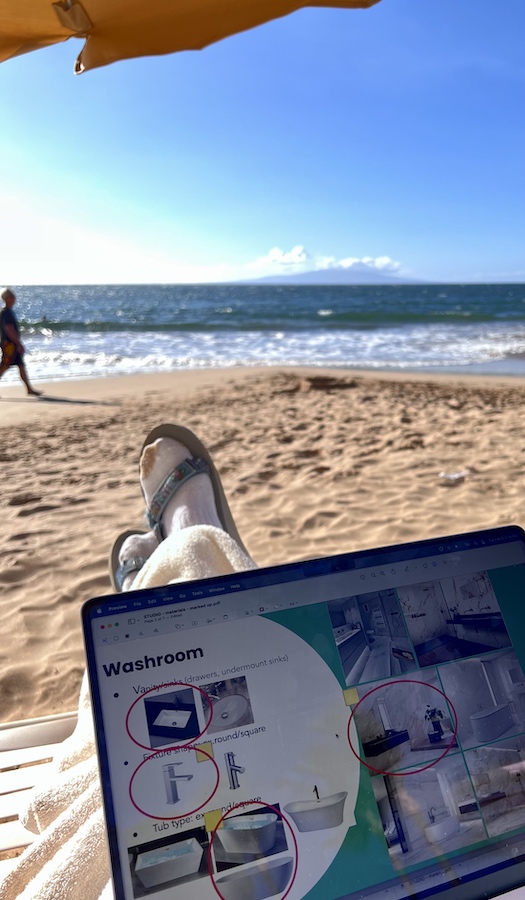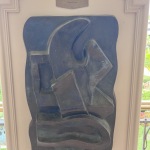
It’s a lonely out there in the world.
Not just at the top either, as the saying goes, but everywhere. We’re atomised, fragmented, individualised, “sovereign-ised,” and increasingly torn apart from our physical social fabrics with every passing year. It’s not even the meddlesome state that’s entirely to blame either, but rather ironically we can look to the “reactionary” counter-punch that’s mostly giving us grief: technology.i
This undercurrent of this all-too-personal struggle goes some ways to explaining everything from the popularity of Joe Rogan,ii everyone’s favourite curious buddy, to the All-In Podcast, everyone’s favourite American-Exceptionalists and capitalist apologists, to Siri and Alexa, everyone’s favourite CIA operatives. Those symptoms being as they are, what’s the kintsuge to these cracks in our personal porcelains? Family time, sun, and art of course!iii
So off we went with the kids and both sets of grandparents to the spotless beaches of Maui, almost exactly four years after our last babymoon here. What ensued was a beautiful ten days of home-cooked meals, listening to family stories, beach time,iv dinner dates, video games,v card games,vi bicycle rides,vii water slides, and just a smidgen of fine art for good measure.viii
The fine art highlight was almost certainly the exquisite collection of bronzes by Fernand Léger at the hotel connected to our rented townhouse.ix The bronzes might even have been “real” ones! But when there’s no blockchain provenance, “original” can be a very tricky thing. Just ask MBS. Still, these bronzes lit up the shopping promenade with timeless elegance. Each with their own personalities and presences, the Légers would make wonderful ruins for future archeologists, don’t you think?
So yea, tech is at best neutral; at worst lonely-making. Thank goodness for family. And for sun.x And for art.
The Polynesians really had it figured out…

___ ___ ___
- To quote the good Rabbi Zohar for the umpteenth time on these pages and certainly not the last:
Why is existentialist philosophy a modern phenomenon? Why is it that moderns obsess about questions of identity and personal purpose in a way that is scarcely found amongst ancient writers? Why is it that Kierkegaard and Nietzsche could write only in the 19th century, but not in the 10th century B.C.E.?
One possibility is that moderns suffer identity crises and confusions more than their ancient ancestors. But why?
Here are some potential causes for the malaise that Marx lamented as “alienation” but that other modern thinkers re-branded as the cost of heroic striving:
- More social mobility means you don’t accept your given lot in life.
- More geographic mobility means you don’t accept your given culture as innately true.
- More ideational mobility (the spread of ideas through technology) means you encounter more ideological diversity.
- Urbanization means you feel small relative to your surroundings.
- Globalization means you feel small in the world.
- The key point is that mobility of all kinds, which we associate with opportunity, also tracks with a sense of meaninglessness—because the more that is up for invention, the less guidance one has on what to do.
Individualism doesn’t lead to technological innovation so much as technological innovation makes individualism inevitable. Moderns are obsessed with the individual because they saw the industrial revolution gut the stability of the tribe and the village.
Although we think of individualism as a political philosophy or worldview, it’s more likely that it’s a response to a lived crisis than it is the result of first principles thinking. We don’t derive the individual. We find ourselves individuated, in part, by the reality of increasing complexity and specialization.
Responses to existentialism that repudiate it as “selfish” or else as “relativistic” fail to account for the ways that modernization has made identity confusion a stubborn problem. Going back to Aristotle might work for a few academics, but Aristotle’s thought was written at a time before the printing press, let alone the internet.
The biggest challenge facing ancient systems of thought is not disproof by “science,” but lack of resonance wrought by new technology. Worldview is downstream of technology.
- Archived. ↩
- I originally went on this holiday thinking that the solution was unscheduled “zen time” but that was false! Turns out that when you refuse even a modicum of daily planning, that it’s much easier to get lost in the eddies of trapped energy than it is to float with the waves and birds. Lesson learned: planning isn’t evil! ↩
- Can you count all 90 sand castles?

- We travelled with our Nintendo Switch and it was amazing. Mario Kart 8, Mario Maker 2, and Mario Golf got a workout in the peak heat of the day. ↩
- Go-Fish was particularly popular. ↩
- Down the 10`000-foot elevation of Haleakala, naturally, starting out high above the clouds:

- As you can see in the picture at the top of this article, my creative energies were being channeled into selecting finishes and furnishings for my new studio space. Yes yes, I know that I’m leveraging technology to distract from the stunning scenery and the trifecta of family, sun, and art, but what can I say, ↩
- Apologies for the mediocre photos. The new iPhone 13 Pro Max has a better battery and usefully-sized hard drive but the all-important camera is, well, a bit lacking. ↩
- Sunrise, sunset. ↩













[…] for you, dear reader, to peer into my (peerless) mind? To gaze into the infinite expanse that is this lonesome journey? To wonder how you stack up? To wonder how I stack up? Or even to see how you do/don’t want […]
[…] 2. Less urban sprawl: While the Broadacre City thesis has its merits, the returns to serendipity afforded by urban density knows no replacement. So with more limited driving ranges, longer charging times typical of EVs, and immature charging infrastructure as yet,iii the reduced capacity of these vehicles as long-distance transport will tip the scales in favour of more urban density at the margin.iv This should lead to more pleasant (and walkable?) neighbourhoods that go at least some ways towards reducing the anxiety inherent in atomised modernism. […]